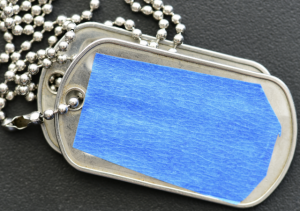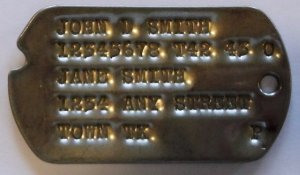- Joined
- Jan 26, 2003
- Messages
- 22,185
An aide who was cleaning in our basement today found my father's dog tags from World War II. At first I didn't believe they were his real dog tags. I couldn't believe they were still around and, if they were, that they would just have been left floating around somewhere on a workbench. Then they seemed terribly lightweight. I had always imagined dog tags to be heavier. But as I studied them they had information (like an old address) that seemed terribly old-fashioned. The chain was also very old, very blackened. There were two of them. I realized that they were authentic. My parents had been married in October of 1941, right before the Japanese attack on Pearl Harbor in December of 1941, so my mother was listed on dog tag as his next of kin. Then his serial number was on there. I remember that when I was a child he used to recite it, saying he would never forget it.
My father was still in college in 1941. He graduated in January of 1942 and enlisted in the army. He served until he was demobilized in 1946, seeing service in England (waiting for the invasion of Europe) and France. I was quite moved to see the dog tags. It was tactile evidence that my father's body might have had to be identified by those tags. He was not on the front lines; he was in The Signal Corps. But he traversed the Atlantic in a troop ship while there was warfare. He lived in Liverpool and London while England was under attack (and vividly recalled the buzz bombing of London). And he was not far behind the first troops entering Paris (not to mention being in a vehicle struck by lightning while he and some other soldiers were making candle sticks out of shells). So he was at risk.
Deb
My father was still in college in 1941. He graduated in January of 1942 and enlisted in the army. He served until he was demobilized in 1946, seeing service in England (waiting for the invasion of Europe) and France. I was quite moved to see the dog tags. It was tactile evidence that my father's body might have had to be identified by those tags. He was not on the front lines; he was in The Signal Corps. But he traversed the Atlantic in a troop ship while there was warfare. He lived in Liverpool and London while England was under attack (and vividly recalled the buzz bombing of London). And he was not far behind the first troops entering Paris (not to mention being in a vehicle struck by lightning while he and some other soldiers were making candle sticks out of shells). So he was at risk.
Deb









300x240.png)